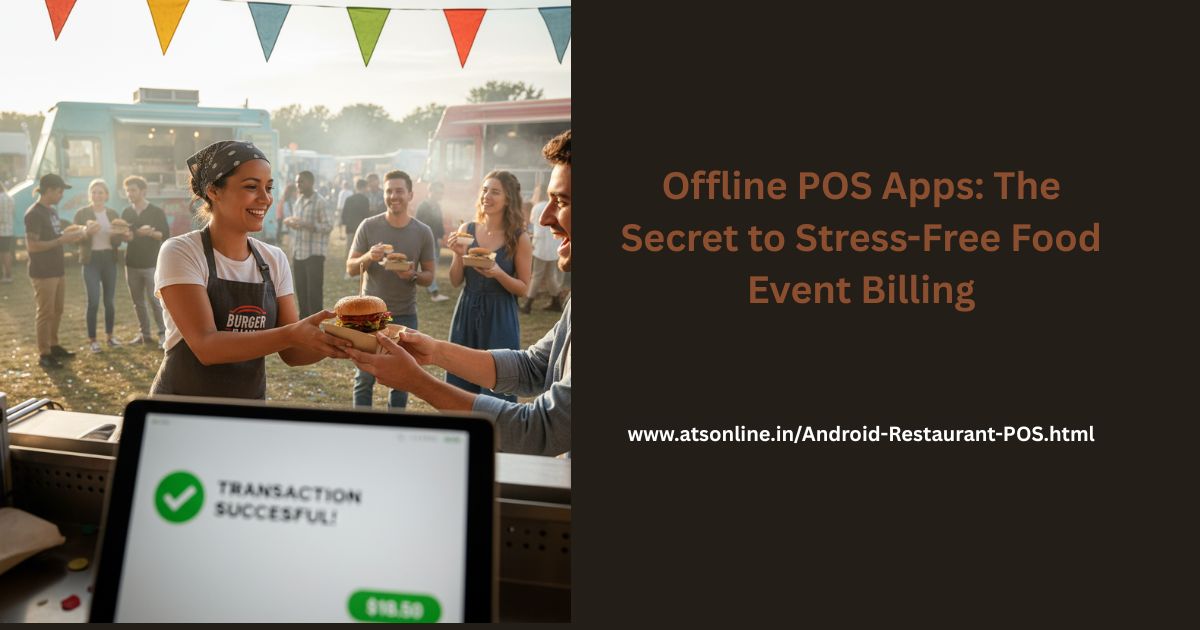Picture this: It’s the peak of the lunch rush at the biggest food festival of the year. The line at your food truck is 20-deep, customers are hungry, and your signature tacos are flying off the grill.
Then, it happens. The Wi-Fi signal, shared by 50 other vendors and 5,000 attendees, sputters and dies.
Your online-only POS system grinds to a halt. The screen freezes on “Processing…” You can’t take card payments. You can’t track orders. The line groans, a few people peel off to go to the cash-only pretzel stand, and your stress levels go through the roof.
This is the nightmare of every event food vendor. But what if that connection loss didn’t matter? What if your sales could continue, uninterrupted, fast, and secure?
Welcome to the world of offline POS apps—the secret weapon for stress-free food event billing.
❓ What Exactly Is an Offline POS App?
An offline POS app, or “offline mode” POS, is a point-of-sale system that runs on a tablet or smartphone and does not require a constant internet connection to function.
Here’s how it works:
- It Runs Locally: The app stores all your essential data—your menu, prices, and inventory levels—directly on your device (like an iPad or Android tablet).
- It Works Anywhere: You can ring up sales, open tabs, and even track inventory without connecting to Wi-Fi or using mobile data. The app is fast because it’s not “calling” the internet for every single action.
- It Syncs Later: When you do get a stable internet connection (back at your commissary, at home, or when the festival crowd thins out), the app automatically syncs all the transaction and inventory data back to the cloud. Your sales reports, customer data, and stock levels all update seamlessly.
It’s the perfect blend of mobile-first technology and real-world resilience.
The High Stakes: Why Online-Only POS Fails at Events
Relying on an online-only system at a food event is a massive gamble. The “venue” is often a field, a parking lot, or a crowded convention center where the internet infrastructure is notoriously unreliable.
When that connection fails, you’re left with:
- Lost Sales: Every minute your system is down is a minute you’re not making money. Customers won’t wait forever.
- Payment Chaos: You’re forced to switch to “cash only,” which instantly alienates the 70-80% of customers who only carry cards.
- Inventory Nightmares: If your POS is down, you can’t digitally track what you’re selling. This leads to manually tracking sales (prone to errors) or, worse, overselling your most popular item.
- Damaged Reputation: A slow, clunky, or broken checkout process looks unprofessional and frustrates customers, leaving a bad taste in their mouth (no matter how good your food is).
🚀 5 Ways Offline POS Apps Save Your Food Event
Switching to a robust offline POS app isn’t just a backup plan; it’s a core business strategy for event vendors. Here’s why it’s the key to stress-free billing.
1. Uninterrupted Sales (The Show Must Go On)
This is the number one benefit. Whether you’re in a basement pop-up, a remote field for a wedding, or the middle of a packed stadium, your ability to take an order is never in question. No Wi-Fi? No 5G? No problem. You can process sales, take orders, and keep the line moving.
2. Blazing-Fast Transactions
Because the app isn’t waiting for a response from a distant server, every tap is instant. Adding items to an order, applying discounts, and opening the cash drawer takes fractions of a second. In a high-volume environment, shaving just 10-15 seconds off each transaction can result in dozens of extra sales per hour.
3. Accurate, Real-Time Inventory (Even Offline)
A good offline POS app will continue to track your inventory with every sale. If you sell your last “Pulled Pork Sandwich,” the app will update the local database on your tablet. This prevents other staff members from selling an item you’ve already run out of, dramatically reducing errors and customer disappointment.
4. Professionalism and Customer Trust
Instead of a panicked “Our system is down!” you deliver a smooth, professional, and quick checkout experience. This builds trust and encourages repeat business. Customers appreciate efficiency, and a seamless payment process is a huge part of their overall experience.
✅ What to Look for in an Offline POS App
Not all “offline modes” are created equal. When choosing a POS for your food truck or event business, ask these specific questions:
- Is it True Offline? Can you do everything offline (take orders, track inventory, process payments) or just record cash sales? You need the former.
- How Does It Handle Card Payments? Does it have “Store and Forward” capabilities?
- Is It Easy to Use? You need to train seasonal or event staff in minutes, not hours.
- What is the Battery Drain? The app shouldn’t drain your tablet’s battery before the event is over.
- How Does It Sync? Is the sync automatic? Can you force a manual sync when you get a bar of service?
Stop Stressing, Start Selling
Don’t let your revenue and reputation be at the mercy of a weak Wi-Fi signal.
For food truck owners, caterers, and pop-up vendors, success is measured in speed, reliability, and service. An online-only POS is a liability. An offline POS app is an investment. It’s the tool that ensures you can make the sale, serve the customer, and manage your business, no matter where you are.
It’s time to cut the cord and make your next food event truly stress-free. visit:
https://atsonline.in/Android-Restaurant-POS.html
You can reach us by phone at +91 9810078010 or by email at ats.fnb@gmail.com. Thank you for your interest in our services.
FAQs on Offline POS Apps for Food Events
1. Can I use multiple tablets or devices offline at the same time?
This depends on the specific POS system. Some advanced systems can create their own local Wi-Fi or Bluetooth network, allowing multiple devices to “talk” to each other (and share order/inventory data) without an internet connection. In other, simpler systems, each device will work independently offline and then sync its own data to the cloud once it gets a connection. If you run a multi-terminal setup, ask your POS provider specifically about their “multi-device offline” capabilities.
2. Do I need special hardware to run an offline POS?
Not usually! Most modern offline POS apps are designed to run on standard tablets like Android devices. The main component you’ll need is a compatible card reader (often Bluetooth-enabled) that is specifically designed to support offline “Store and Forward” transactions.





The clarity here is outstanding.